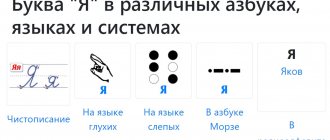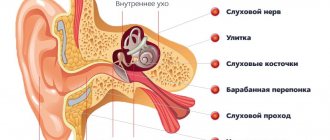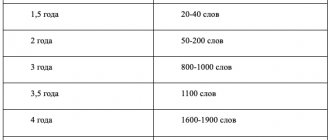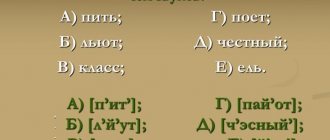The fact that the language's dictionary contains approximately 300 thousand words is only of theoretical interest for a beginner learning this language. Perhaps the main principle for the reasonable organization of your studies, especially at the initial stage, is the economy of words. You need to learn to memorize as few words as possible, but do it as best as possible.
Let us emphasize that our approach is directly opposite to the guiding principle of “suggestopedia”, with its emphasis on the abundance of words presented to the student. As you know, in accordance with its canons, a beginner needs to be literally “showered with words.” It is best to give him or her 200 new words every day.
Is there any doubt that any normal person will forget all those numerous words with which he was “showered” using this, so to speak, method - and most likely very soon, in just a few days.
Don't chase too much
It will be much better if at the end of a certain stage of study you know 500 or 1000 words very well than 3000 - but poorly. Don’t let yourself be led into a dead end by teachers who will assure you that you need to first learn a certain number of words in order to “get into the swing of things.” Only you yourself can and must decide whether the vocabulary you have mastered is sufficient for your goals and interests.
Language learning experience shows that about 400 well-chosen words can cover up to 90 percent of the vocabulary you need for everyday communication purposes. In order to read, you will need more words, but many of them are only passive. Therefore, with knowledge of 1500 words, you can already understand fairly meaningful texts.
It is better to master the words that are most necessary and important to you than to constantly rush to learn new ones. “He who pursues too much risks missing everything,” says a Swedish proverb. “If you chase two hares, you won’t catch either,” says a Russian proverb.
Test your knowledge
If you want to test your knowledge on the topic of this lesson, you can take a short test consisting of several questions. For each question, only 1 option can be correct. After you select one of the options, the system automatically moves on to the next question. The points you receive are affected by the correctness of your answers and the time spent on completion. Please note that the questions are different each time and the options are mixed.
We remind you that for the site to fully function you need to enable cookies, javascript and iframe. If you see this message for a long time, it means that your browser settings do not allow our portal to function fully.
Source
Vocabulary in oral speech
Very roughly speaking, about 40 well-chosen, high-frequency words will cover about 50% of word usage in everyday speech in any language;
- 200 words will cover about 80%;
- 300 words - approximately 85%;
- 400 words will cover about 90%;
- Well, 800-1000 words are about 95% of what would need to be said or heard in the most ordinary situation.
Thus, the right vocabulary helps you understand quite a lot with very little effort spent on cramming.
Example: if a total of 1000 words are spoken in an everyday conversation, then 500 of them, that is, 50%, will be covered by the 40 most common high-frequency words.
We emphasize that these percentages, of course, are not the result of exact calculations. They simply give the most general idea of how many words it will take to feel confident when entering into a simple dialogue with a native speaker. In any case, there is no doubt that by correctly choosing from 400 to 800 words and remembering them well, you can feel confident in a simple conversation, since they will cover almost 100% of those words that you cannot do without. Of course, under other, less favorable conditions, 400 words will cover only 80% of what you need to know - instead of 90 or 100%.
What's more important
Both dictionaries are extremely important for effective communication, since the active dictionary allows you to correctly express your thoughts, and the passive one allows you to understand the statements of other people without much difficulty, develop a semantic guess, even when communicating on completely new, unfamiliar topics.
However, it is always worth maintaining a natural balance. That is, to work efficiently both in receiving and delivering information. You may perfectly understand everything that is said to you, but it will be very difficult to say anything. This situation will arise if you do not pay enough attention to speaking practice.
Either way, there is no point in deliberately developing any particular skill. When learning new vocabulary, words will sort themselves. Some will seem interesting to you, some will be useful, and some you will simply put aside as unnecessary in the passive stock of the English language.
Read also
Test Past Simple / Past Continuous
Reading vocabulary
When reading, having correctly chosen and well remembered about 80 of the most common, most frequent words, you will understand about 50% of a simple text;
- 200 words will cover approximately 60%;
- 300 words - 65%;
- 400 words – 70%;
- 800 words - approximately 80%;
- 1500 - 2000 words - about 90%;
- 3000 — 4000 — 95%;
- and 8,000 words will cover almost 99 percent of the written text.
Example: if you have a text in front of you with a volume of approximately 10 thousand words (this is approximately 40 printed pages), then, having learned the most necessary 400 words in advance, you will understand about 7000 words that are used in this text.
Let us note again that the figures we give are only indicative. Depending on various additional conditions, 50 words will cover up to 50 percent of the written text, but in other cases you will need to learn at least 150 words to get the same result.
How many words do you need to know to speak Korean?
Have a vocabulary of 1500-2000 words and use them; Be able to use different styles of language depending on the situation - formal or informal.
Interesting materials:
How much does an assessor earn at Yandex? How much does a banker earn on average? How much does Bill Gates earn in one second? How much does Brian Maps earn on Youtube? How much does a well driller earn? How much does a private jeweler earn? How much does Danya Milokhin earn per month? How much does a dermatologist earn in Germany? How much does an announcer earn? How much does a YouTube director earn?
Vocabulary: from 400 to 100,000 words
- 400 - 500 words - active vocabulary for language proficiency at a basic (threshold) level.
- 800 - 1000 words - active vocabulary in order to explain yourself; or passive reading vocabulary at a basic level.
- 1500 - 2000 words - active vocabulary, which is quite enough to ensure everyday communication throughout the day; or passive vocabulary sufficient for confident reading.
- 3000 - 4000 words - in general, enough for almost fluent reading of newspapers or literature in the specialty.
- About 8,000 words - provides full communication for the average European. There is practically no need to know more words in order to communicate freely both orally and in writing, as well as read literature of any kind.
- 10,000-20,000 words is the active vocabulary of an educated European (in their native language).
- 50,000-100,000 words - the passive vocabulary of an educated European (in their native language).
It should be noted that vocabulary alone does not ensure free communication. At the same time, having mastered 1,500 correctly chosen words, with some additional training, you will be able to communicate almost freely.
As for professional terms, they usually do not present any particular difficulties, since in most cases this is an international vocabulary that is quite easy to master.
When you already know about 1500 words, you can start reading at a fairly decent level. With passive knowledge of 3,000 to 4,000 words, you will be fluent in reading literature in your specialty, at least in those areas where you are confident. In conclusion, we note that, according to calculations carried out by linguists based on a number of languages, the average educated European actively uses about 20,000 words (and half of them are quite rare). In this case, the passive vocabulary is at least 50,000 words. But all this concerns the native language.
What is the difference
Passive vocabulary includes those words that you learn in the process of working with words, understand them, but cannot yet use in your daily speech. For example, you can find frequent use of the word “talk” in the active dictionary. The word “chat” is in the passive, but it is rarely used.
Or it can be explained using the example of the Russian language. It should be clearer this way. Take, for example, the word “traffic light”. You know this word and can easily use it where appropriate. But take, for example, the words “kaleidoscope” or “conceptual”. You know the meaning of these words, recognize them in the text and, if desired, will be able to explain their meaning to another person. But in your everyday speech you either don’t use them or use them very rarely.
This phenomenon is observed not only in English, but in other languages too. There are rarely used (passive) words and frequently used (active) words. Words can go from active to passive if you don't use them, and vice versa - from passive to active if you start using it quite often.
vocabulary also depends on the level of knowledge of each student . The more words he has, the better and more varied his speech will be. Let's talk in more detail about the individual dictionary.
Read also
Rules for reading English consonants
Russian-speaking vocabulary test
An interesting study was recently conducted to determine the volume of words among native Russian speakers. It was carried out in the form of testing, where those interested marked in the provided list the words they understood and used. Words were marked only if the definition was fully understood.
To improve the quality of testing and sort out unreliable information, non-existent designations were present in the lists. The presence in the subject's questionnaire of at least one non-existent word marked as familiar to him was considered unreliable information and was not taken into account.
During the work carried out, the following data were obtained:
The study assessed the educational level of the subjects, yielding interesting findings. It turns out that people have the greatest amount of words at different times in their lives. Secondary specialized education implies the end of word growth at the age of 40, and higher education a little later - after 50 years. This 10-year gap is explained by the discrepancy between the work performed and the position held by people with different education. Some people at the age of 50 read scientific books and gain new knowledge due to the specifics of their work or at their own request for self-education.
An interesting fact was also revealed, which showed that the subjects who completed their studies at the educational institution and did not graduate for personal reasons had the same passive vocabulary.
Vocabulary vocabulary of adults with different levels of education:
The education received, of course, affects a person’s vocabulary, but not 100%. A person himself makes a huge contribution to the development of vocabulary, constantly improving himself and engaging in self-education. Therefore, it is easy to meet a person who only graduated from school with a vocabulary several times larger than that of someone who received a higher education. The main role in this issue is played by a person’s sociability, occupation and lifestyle.
The conducted research does not provide a complete picture of the vocabulary of the average Russian person, as it contains small errors. But despite this, it helps to determine the connection between vocabulary and age and level of education.
About Pareto's law and the importance of linguistic guesswork
You may have heard of Pareto's law, also known as the 80/20 principle. The Italian engineer and philosopher Vilfredo Pareto studied numerous phenomena and objects, from land ownership to pea pods, and as a result came up with a rule that was called Pareto's law: 20% of the causes give 80% of the effects. Or, if you apply the law to study or work: 20% of the effort gives 80% of the result.
English language learners need to understand 90-95% of the words most commonly used in everyday life. Where exactly do these numbers come from? This is approximately how many words you need to know in order to clearly understand what is written and said. In addition, having learned just that many words, you will be able to guess the meaning of the remaining 5-10% simply from the context! Not quite 80/20, but the principle is the same: only a small part of your efforts will bring a significant result.
This is an extremely important point! If you have already reached a high level of understanding of the language, it is time to close the dictionary and allow yourself to learn “inductively”, from context and by guessing. You already do this every day - no one knows all the words in their native language. So why not do the same with English?
Don't have time to read the entire article? Watch the shortened version in our video:
Some people try to enrich their vocabulary in order to be interesting conversationalists, make useful connections and make a favorable impression on people. Others need improved vocabulary for professional and creative purposes - from inventing poetry and musical lyrics to writing scientific dissertations.
You should also have a clear goal, even if not necessarily a specific one. For example, you can calmly start learning new words and speech structures for general development. And don’t doubt it, you will definitely need it.
So, let's get down to practical advice.
How to learn words effectively
Imagine that English words are bricks. Only in this analogy we will not build, but carry them. From the “English Language” warehouse you need to drag a certain number of bricks to your “My Knowledge” warehouse. They won’t come to you on their own, and you have to constantly go after them and carry them. Yes, it's hard. Yes, sometimes it seems like it will take you years to move enough building materials. But you know for sure that there is progress.
The more often you go to the warehouse, the faster you will get the required quantity. You can also make things easier for yourself. Get smart and build the cart as an effective approach to learning. Now we will tell you how to learn more bricks, that is, words, with less effort and in less time.
- Use word learning apps like ED Words . There the words are divided into sets. You can take words from there or add your own. The program itself will set repetition intervals for you so that the word is stored in long-term memory as soon as possible.
- Don't try to learn a hundred thousand words at once. It is better to learn a little, but work through this small amount.
- Use the words you have learned in your speech. Otherwise, you will forget them over time. Practice in conversation clubs or find an English-speaking companion on the Internet. As a last resort, build dialogues in your head from time to time.
What words do you need to learn to know English?
Not all words are equally useful. Many learning apps collect sets of mostly nouns. For example, 100 words on the topic “Bedroom” - and there are words like “pillowcase”, “duvet cover”, “night light” and so on. And there are several hundred such sets.
Their main problem is that these sets themselves will not allow you to speak English normally. Language consists of nouns, adjectives, verbs, adverbs, and so on. In the same “Bedroom” set it would be necessary to at least add “tuck”, “lay” and so on. This is one of the advantages of the ED Words application compared to others - it contains words from different parts of speech, plus they can be practiced in context and made sentences in the simulator.
So, what should be the vocabulary of English words? As you already understood, it should be versatile (words of different parts of speech on different topics). Plus, it should include trending words, and not just random lists of words by topic. It’s better to learn introductory words, slang and so on. Learn what will really be useful to you.
Read also
How to correctly translate English proverbs and sayings










